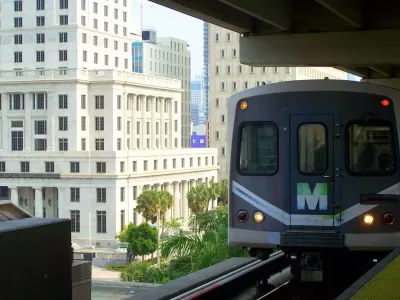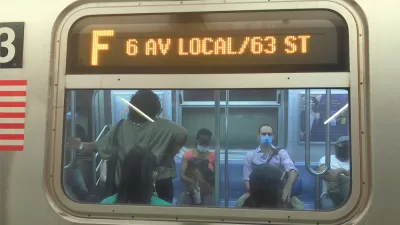The funding in the draft stimulus funding package making its way through Congress falls short of the total requested by the American Public Transportation Association, but would go a long way to helping transit agencies weather the pandemic.

An article by TransitCenter provides insight into the funding proposed for U.S. transit agencies by the economic stimulus plan making its way through Congress, promised by Democratic congressional leadership for approval before the end of the month.
With public transit agencies stuck in a death spiral of declining ridership and revenues during the pandemic, much of the attention of these repeated rounds of stimulus has concerned whether the federal government is providing enough support for public transit. (If approved, this will be the third federal stimulus package, after the CARES Act, approved by Congress in March 2020, and COVID-19 Emergency Relief Act of 2020, approved in December 2020.)
According to this article by TransitCenter, the $30 billion in funding proposed in the current version of the stimulus package would support transit agencies until some point between the middle of 2022 and the end of 2023. The Biden administration had previously proposed $20 billion for transit, which would last until the beginning of that spectrum. The American Public Transportation Association requested $39.3 billion, which TransitCenter estimates would last until the conclusion of that spectrum.
"In brief, the more emergency funding is secured now, the longer agencies will be able to maintain service before needing another round of relief. Because economic activity and transit ridership are not expected to fully rebound immediately following a mass vaccination campaign, the fiscal disruption for transit agencies is projected to last years," according to the article.
The article includes details on the methodology of the analysis and also provides more findings about the depth of transit revenue declines in 2020, and the projected declines in revenue for 2021.
The article also includes a call to action regarding TransitCenter's recent advocacy work for new funding to support transit operations, in addition to capital investment funding.
FULL STORY: Analysis: How Long Will New Emergency Relief Funds Last for Transit Agencies?

Planetizen Federal Action Tracker
A weekly monitor of how Trump’s orders and actions are impacting planners and planning in America.

Chicago’s Ghost Rails
Just beneath the surface of the modern city lie the remnants of its expansive early 20th-century streetcar system.

San Antonio and Austin are Fusing Into one Massive Megaregion
The region spanning the two central Texas cities is growing fast, posing challenges for local infrastructure and water supplies.

Since Zion's Shuttles Went Electric “The Smog is Gone”
Visitors to Zion National Park can enjoy the canyon via the nation’s first fully electric park shuttle system.

Trump Distributing DOT Safety Funds at 1/10 Rate of Biden
Funds for Safe Streets and other transportation safety and equity programs are being held up by administrative reviews and conflicts with the Trump administration’s priorities.

German Cities Subsidize Taxis for Women Amid Wave of Violence
Free or low-cost taxi rides can help women navigate cities more safely, but critics say the programs don't address the root causes of violence against women.
Urban Design for Planners 1: Software Tools
This six-course series explores essential urban design concepts using open source software and equips planners with the tools they need to participate fully in the urban design process.
Planning for Universal Design
Learn the tools for implementing Universal Design in planning regulations.
planning NEXT
Appalachian Highlands Housing Partners
Mpact (founded as Rail~Volution)
City of Camden Redevelopment Agency
City of Astoria
City of Portland
City of Laramie





























